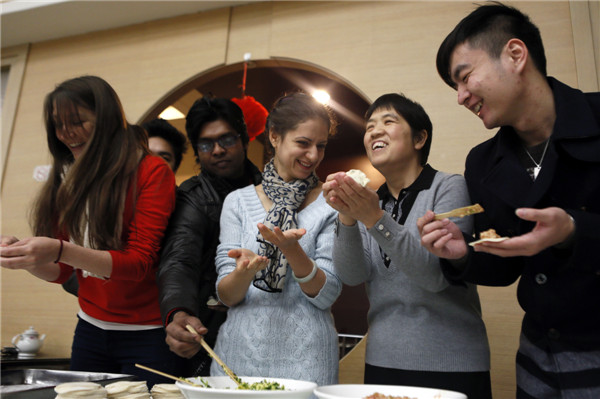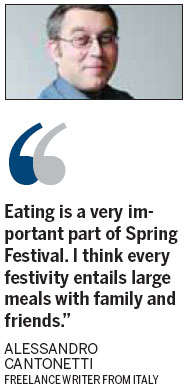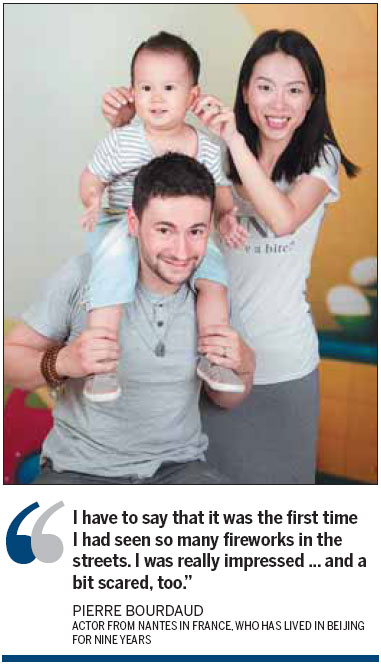 |
|
Liu Wei (second right), deputy Party chief of Beijing Language and Culture University, shows Maria Bolocan (second left), a Romanian student how to make dumplings at the school's party to celebrate the coming Spring Festival. Zou Hong / China Daily |
A growing number of expatriates are choosing to work, study and live in China, lured by increased opportunities for exchanges in cultural and economic fields in the three decades since the pace of reform and opening-up accelerated.
In 1980, fewer than 20,000 foreigners had lived in China for more than six months, according to the Ministry of Public Security.
However, by 2011 the number had soared to nearly 600,000, with some 220,000 expatriates working in joint ventures or as teachers and representatives of foreign institutions.
Some of those who have lived in the country for many years consider China as their second home, with many finding Chinese spouses and becoming the sons- or daughters-in-law of Chinese families.
Spring Festival, or Chunjie, is upon us once again. As we head into the country's most important holiday, one that revolves around all-important family reunions, how do these "half-Chinese" regard the festivities?
In some senses, Chunjie is similar to Christmas in Western countries, so how do the two compare?
We asked four expatriates for their views and to share their Chunjie stories.

February will mark my fourth year in China, and having been married to a Chinese woman for seven years now, I've seen my fair share of Spring Festivals.
But the first and longest-lasting impression must be the sheer number of fireworks I saw the first time I was in Beijing during the celebrations. In Rome, we're used to celebrating (Western) New Year with fireworks, but that's nothing compared with the number set off in Beijing during Spring Festival.
Another thing that impressed me was the length of the celebrations. The fireworks are set off intermittently for an entire week, something I've never seen at home. We usually set off fireworks for one or two hours on the night of New Year's Eve and that's all, but here it's kind of continuous. It can be noisy at times, but it's certainly interesting to see.
In my experience, it (Spring Festival) can probably be equated with the Christmas celebrations in Italy. Right now, I cannot think of any holiday that's more important for us during the year. Also, it's not just Christmas Day but a long period known as "The Festivities", including St Stephen's day (Dec 26), New Year's Eve, New Year's Day and Epiphany on Jan 6, during which kids usually receive gifts and sweets, and hear all the stories relating to Father Christmas - Babbo Natale - and la Befana, an old lady who rides a broom who is said to bring presents and sweets to good kids on the night of Jan 6 and 7. The sweets and candies are usually stuffed into a stock.
In my experience, because it's tied up with my childhood and full of nice memories of being at home with my family, of course, I personally prefer Christmas more than Spring Festival, but I think that's normal - since I was a kid, I've grown up celebrating that way, and I eagerly await those days.
Eating is a very important part of Spring Festival. I think every festivity entails large meals with family and friends. Also, for at least two or three continuous days in Italy, there are feasts at dinner or lunch, with relatives or friends at different locations. Usually, these are held at people's homes, but we sometimes go to a restaurant.
When I was a kid we used to go to my aunt's house for Christmas Eve dinner. Then on Christmas Day we went to my grandparents' house for lunch, and then back to my aunt's for dinner. On Dec 26, we sometimes gathered for lunch but it wasn't like that every year, and it diminished as my cousins and I grew up and my relatives grew older.
Personally, I like eating, even if sometimes it's not physically pleasant to eat so much for so long, but it's nice to eat some special holiday food and sweets, which we don't normally eat at other times. As for alcohol, it's a normal part of celebrating so I'm completely fine with that, as long as it remains a "festivity-only" thing.
Alessandro Cantonetti was talking to He Na.

Spending time with the family is the most important thing
My first Chunjie (Chinese Spring Festival) was spent at my wife's home in the Fangshan district of Beijing.
I have to say that it was the first time I had seen so many fireworks in the streets. I was really impressed ... and a bit scared, too. The whole sky was illuminated with colors. It was incredibly beautiful. We couldn't even hear ourselves speak.
At one point, I looked to my left and a firework exploded right next to my wife and me. One of the launchers had fallen and was pointing towards the crowd. We had to run away from the rockets; it was really thrilling and fortunately no one was hurt.
I was actually very lucky because the launcher that fell and fired at the crowd happened to be mine. Oops! People just laughed after the incident and went back to watching the fireworks as if nothing had happened.
Nowadays I tend to watch fireworks from afar; I don't play with them anymore. We have a great view from our apartment and it's a lot safer too!
In some senses, Chunjie in China is like Christmas in Western countries.
You ask which I prefer? Well first, I must list the differences between the two. Of course, Christmas has a religious meaning whereas Chunjie has quite pragmatic origins. Westerners celebrate "birth", according to a solar calendar, while China follows the moon to prepare for "the rebirth".
We have a Christmas tree and the story of Santa Claus, while Chinese people tell the story of Nian, a monster that comes back every spring to eat people and livestock.
In the West, children get presents in their stockings, not money in red envelopes, and we have the hymn Silent Night and turkey - China doesn't sleep and the sky is lit up by fireworks after a plate of dumplings.
You could say that these two holidays are radically different, but I don't believe so. In fact, only those few details listed above make these two holidays different and I believe that Christmas and Spring Festival are very similar indeed.
Why? Because, more than anything else, they're about families getting together. A few weeks ago, I spent my first Christmas with my family back in France in 10 years. I realized then that it's the people you're with, not the place or the size of the tree that makes this time of the year what it is. Without family and friends, these festivals would not be different from any other day of the year, and as much as I love decorating the tree with my family before Christmas, I enjoy making dumplings with my wife and her family during Spring Festival. So I can say that I like Christmas and Spring Festival equally, so long as I spend them with the right people.
Some people complain of being bored with feasting and too much alcohol during the Chunjie holidays.
Again, it's very similar to what we have in France for Christmas: I just kept eating and drinking with my family for days and I gained almost 5 kilos within three weeks when I went back last year. Now, I have to do the same thing here for Spring Festival, so it's a good thing these holidays don't last too long because otherwise I would definitely become obese!
Anyway, I won't drink too much this year because I can't drink white spirit (baijiu) anymore. I got really drunk with it a few years ago and to this day I still can't drink it. I even hate the smell of it.
I will stick to beer so I can drink with everyone else. Moderation is my catchword now!
Pierre Bourdaud was talking to He Na.
